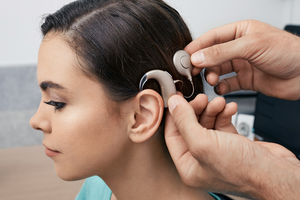CMA action protects outcomes for hearing implant patients
CMA partially prevents sale of hearing implant business after concluding patients potentially worse off.

Image credit: iStock
The Competition and Markets Authority (CMA) has prevented part of a merger between two of the biggest players in the UK’s hearing implant sector. This action will avoid worse outcomes for patients, who rely on these life-changing hearing implants, and higher prices for the NHS, which ultimately funds the cost of these products for patients.
The proposed merger of Cochlear Limited (Cochlear) and Oticon Medical, the hearing implants division of Demant A/S (Demant), was referred for an in-depth Phase 2 investigation, led by an independent inquiry group, in December 2022.
The investigation has found that the merger may lead to a substantial lessening of competition in bone conduction solution (BCS) products. BCS products are implants that bypass the damaged parts of the ear, converting sounds into vibrations that are sent directly to the inner ear.
The CMA’s final report on the merger concluded that:
- The deal would eliminate a major BCS competitor from the market, leaving the merged businesses holding a market share of more than 90 per cent.
- Competition from the one remaining BCS competitor and other hearing solutions would not be sufficient to offset the impact of the deal on competition.
- The prospect for market entry from new players or market expansion by smaller competitors is limited, and not sufficient to prevent competition concerns.
The loss of competition in BCS products that the Merger would bring could result in patients who need these hearing implants losing out with less choice, reduced quality, or less innovation, as well as the NHS, the main buyer of BCS products in the UK, potentially paying higher prices.
To address these concerns, the CMA’s independent inquiry group has prohibited the sale of Oticon Medical’s BCS business to Cochlear. Demant will instead retain its BCS business, which it will continue to run in competition with Cochlear.
The CMA also looked at the impact on the supply of another type of hearing implants (cochlear implants (CI)) at an earlier phase of investigation but found no competition concerns in that sector. The CMA found that the CI and BCS business are largely operated separately today, so can be split up without reducing their competitiveness, enabling the sale of Oticon Medical’s CI business to Cochlear to go ahead.
The CMA’s decision followed the consideration of a wide range of evidence, including concerns raised by clinics, who prescribe these products to patients, and other market participants.
Kip Meek, chair of the independent panel of experts conducting this investigation, said:
Our primary concern is the well-being of patients. We found that the full merger could reduce innovation and quality and potentially cost the NHS more through higher prices.
We’re pleased to find a solution which not only addresses these competition concerns but is also less onerous than preventing the merger entirely.
The CMA will now oversee the separation of the business and will take steps to implement its remedy decision within 12 weeks.
For more information, visit the Cochlear/Oticon Medical merger inquiry page.
Notes to Editors:
- Cochlear (Cochlear Limited) manufactures and supplies hearing devices used by healthcare professionals to treat a range of types of hearing loss, with a particular focus on cochlear implants (CI) and BCS (together, hearing implants).
- Demant (Demant A/S) develops, manufactures, and supplies hearing implants (both CI and BCS) through Oticon Medical. Demant also supplies hearing aids, operates clinics providing hearing care solutions, and supplies hearing diagnostic products and audio solutions for enterprise, gaming, and air traffic control.
- BCS products are used in the treatment of conductive, mixed, and single-sided hearing loss. They bypass damaged parts of the ear by using a sound processor that converts sounds into vibrations that are sent directly to the inner ear. There are two types of BCS products: passive and active. They differ in the way they connect the transducer (that translates sounds into vibrations transmitted through the bone) to the sound processor.
- The CMA has outlined its strategic commitment to ensuring its intervention and remedies take into account those people who may need particular help to be protected from harm. This commitment sits alongside our core work on mergers to ensure that everyone can be confident that they are getting a fair deal. Please read Section 5.6 of our Annual Plan 2023/ 2024
- All media enquiries should be directed to the CMA press office by email on press@cma.gov.uk, or by phone on 020 3738 6460.